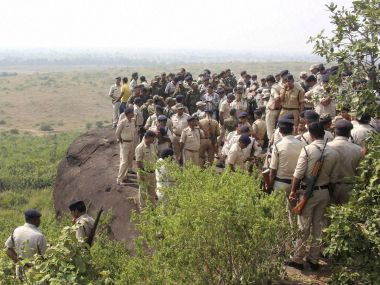There seems to be a striking resemblance between the state of Madhya Pradesh and the nebulous Islamic caliphate spread between Iraq and Syria. The visuals from a video of the encounter of eight suspected SIMI members, who escaped from Bhopal Central Jail on Monday, were no less abominable than the public beheadings of the Islamic State prisoners. The video shows the local people urging the policemen to shoot the dead bodies/half-alive suspected activists of the banned Students Islamic Movement of India (SIMI), egging them on in the cold-blooded killing of the suspected activists. The actions of the security forces, on the outskirts of Bhopal, were indicative of the political journey of Chief Minister Shivraj Singh Chouhan – from a democratically-elected leader to an inefficient political executive, swayed by the blood-thirsty impulses of a mob. [caption id=“attachment_3081712” align=“alignleft” width=“380”]  Police investigate the encounter site at the hillocks of Acharpura village after the STF killed 8 SIMI activists. PTI[/caption] Right from the word go, the state administration conducted itself in a manner which is quite akin to the functioning of a well-organised gang. The Bhopal Central Jail, one of the safest prisons in Madhya Pradesh, is a well-guarded facility for under trials, whose safety and security are the constitutionally-ordained responsibility of the state. It is indeed a matter of shame for the jail authorities that the eight SIMI activists – facing trial on sedition, bank robbery charges among others – not only managed to escape but also killed a security guard in the process. Since their escape, however, the police showed its ‘heightened’ efficiency. They tracked down the escapees and gunned them down, all in less than five hours. This cock and bull story would pass muster had it not been for the technologically-abled villagers, who caught the whole thing on video. The videos clearly show that those killed could have easily been arrested and brought to book. If the police had conducted itself within the ambit of the law, they would have framed a water-tight case against the SIMI activists. But instead, they found extra-judicial execution to be the best available option. This leads to a pertinent question: From where do these policemen get the confidence to violate the law so flagrantly? The answer to this query became apparent straight away, when the state’s home minister, Bhupendra Singh, patted the back of the security forces for doing a commendable job. The chief minister also expressed his happiness with the “gallant act” of the men in uniform. Ironically, those in power feel that even if the summary execution of the under trials, without due judicial process, violates the basic principle of justice and equity, it is just a minor collateral in the war against terrorism. Of late, we have heard of many such stories emanating out of Madhya Pradesh, where the police had acted in a brazen communal manner. Opposition leaders have often accused the chief minister of acting in a partisan manner in order to please his bosses in the Rashtriya Swayamsevak Sangh (RSS). The killing of the SIMI activists exposes the hideous face of a dangerous blend of a subversive ideology with criminalised and inefficient governance. Madhya Pradesh has emerged as a clear manifestation of this pernicious cocktail. https://twitter.com/ANI_news/status/792977466008535040 Of course, it would be naïve to assume that the Bhopal incident is reflective of a new trend. Far from it. The history of fake encounters in post-independent India can be traced back to Indira Gandhi, when a western Uttar Pradesh gangster, known as Sundar, was killed at the instance of Sanjay Gandhi prior to the emergency. Those involved in the encounter were rewarded by the then prime minister. Similarly, VP Singh, in his stint as UP chief minister, let loose the state police as a killing machine to randomly pick and execute dacoits in the Chambal ravines. As the gangsters acquired more power and started to get political patronage, the extra-judicial execution not only found social approval but was also glamorised by many film-makers in Bollywood. At the political and governance level, the killings in fake encounters were cited as a recipe for success in Punjab and parts of North Eastern states like Tripura. With people’s confidence in the efficiency of the judiciary reaching its nadir, the state found instant justification for its recklessness. A long list of extra-judicial executions in Uttar Pradesh, Bihar and Madhya Pradesh would reveal the ease with which the state’s killing machine (read the police) got away with cold-blooded murders. Take the cases of Maliana, Hashimpura and Pilibhit, where UP police picked up innocents and shot them, while the accused were never effectively brought to book. In most of these cases, those accused of killing resorted to patriotism, by assuming the role of protectors of the country’s interests. The killings in Bhopal are merely a sequel to this sinister trend, which in fact not only debilitates the concept of nationhood but also flagrantly violates constitutionalism. The visuals from Bhopal’s encounter are a clear manifestation of the apostasy of those who swear by the constitution. The Bhopal jailbreak was the second such incident in the last three years. A similar incident had occurred in 2013, when seven SIMI members had managed to escape from a jail in Khandwa, Madhya Pradesh.
The SIMI activists’ killing exposes the ugly face of a dangerous blend of subversive ideology with criminalised and inefficient governance in Madhya Pradesh
Advertisement
End of Article


)

)
)
)
)
)
)
)
)



